공지사항
-
- '노란봉투'캠페인/국제연대..
- no chr.!
2251개의 게시물을 찾았습니다.
The Korean Federation of Construction Industry Trade Unions (KFCITU) issued last Thursday the following press release:
We call on the Lee Myung-bak Gov't to Stop the Repression of Vietnamese Migrant Construction Workers!
10 Vietnamese migrant workers were recently imprisoned for having demanded better treatment while working on a construction site at the Incheon New Port last year.
Hyundai Construction was the main company overseeing the construction at this site. Roughly 180 Vietnamese workers working on the site were employed by Taeheung Construction, a subcontractor contracted with Hyundai Construction. These workers were mainly responsible for iron bar work, laying concrete and plastering. They worked for 12 hours at a time on two nighttime shifts. Taeheung Construction had provided three meals a day. Last June, however, the company began deducting 8,000 won a day for two meals, seeking to increase its profits at the workers' expense.
Resenting this bad treatment, the workers began demanding improvements last July. The company, however, threatened them saying, "If you don't work, we will report you to the Ministry of Labor and have you all deported." Further angered, the workers refused to work from July 22 (Thurs.) to July 25 (Sun.) in protest against the company's attitude.
The company did nothing to meet the workers' demands. Instead it reduced the their pay, recognizing only 11 hours of work when they in fact worked for 12. In response, the workers again refused to work from January 9 (Sat.) to Jan. 10 (Sun.), 2011.
We are enraged by the fact that Taeheung Construction felt it could deducted 240,000 won a month for meals fee, when it was only paying the workers minimum wage (4,110 won/hr.).
In March and April, several months after the workers' action, the Gyeonggi Provincial police arrested and imprisoned some of the workers who were, by that time, working at other worksites. The police have plans to make more arrest related to the incident. What is more, the police and Prosecutor's Office are exaggerating the charges, claiming that small skirmishes that occurred during the action and interpersonal conflicts were actually collective acts of violence. These actions demonstrates the authorities' misguided beliefs that migrant workers should quietly follow the company's orders and that any demands they make for better treatment are by nature illegal. The authorities' actions are clearly labor repression as well as violations of human rights and international law.
The ROK Constitution's guarantee of the 3 basic labor rights (right to association, right to collective bargaining and right to strike) applies to all workers regardless of their nationality and race. In addition, both the ILO and the UN have adopted conventions on the rights of migrant workers, which protect equal treatment for all workers.
Instead of perpetrating labor repression against these migrant workers, the South Korean government should punish the company's illegal treatment and human rights violations, which include requiring workers to work excessively long hours and at night, reductions in break times and refusal of a day off once a week.
Hyundai Construction, the main company at the Incheon New Port site, has been bragging about the fact that it recently won a contract to build a Mariott Hotel in Hanoi, Vietnam worth 1 billion won. This is particularly offensive arrogance, given that the company should be ashamed of its role in this incident. Hyundai Construction should making improving the conditions at its construction sites its top priority and take responsibly for the unjust imprisonment of the Vietnamese workers.
The Korean Federation of Construction Industry Trade Unions (KFCITU) will fight with other labor, migrants, and human rights organizations to win justice for these Vietnamese migrant workers, who have been the targets of repression and unjust imprisonment. And, we will continue to struggle against the repression of construction workers around the world.
June 2, 2011
Korean Federation of Construction Industry Trade Unions (KFCITU)
Affiliate of the Korean Confederation of Trade Unions (KCTU)
Related reports:
☞ 검찰, 베트남 건설 이주노동자 10명에게 중형 구형 (참세상, 6.01)
☞ “밥 더 달라” 시위·파업한 베트남 노동자 10명 구속 (경향신문, 6.01)
☞ ‘인권논란’ 베트남노동자 오늘 선고공판 (인천신문, 6.02)

Reuters reported y'day the following:
S.Korea's Lee vows to get tough on strikes
Conservative South Korean President Lee Myung-bak vowed on Monday to crack down on strikes that cut across industries, as a second stoppage in a week interrupted business, this time at an international bank.
Last week, the government sent in 2,500 riot police to break up a strike at an auto parts maker that had threatened to disrupt production at Hyundai Motor and Kia Motors , whose combined sales are fifth in global car sales.
In a show of force, riot police decked out in body armour and equipped with shields, outnumbered the protesters by about five-to-one.
"The public is never going to forgive any attempt to undermine an entire industry through a strike at one work place," Lee said in a national radio address on Monday, noting the striking factory workers were relatively well paid taking home on average 70 million won ($65,000) a year.
On Monday, union workers at Standard Chartered First Bank walked off the job opposing a management plan to change their terms of employment to annual salary contracts.
The stoppages come amid rising public discontent over inflation, a growing rich-poor divide and welfare issues, while the country's rising household debt has worried economists.
The crackdown was the latest in Lee's tough response to action by unions and is aimed as much at curbing their powerful political influence, experts say.
Unionised labour is seen as an obstacle for more investment both by domestic manufacturers and by overseas investors who see them as responsible for a rigid and volatile labour market.
"What we need is a mutually coexisting economy where cooperation between the labour and management raises productivity which leads to investment and more jobs," said Lee, a one-time boss of one of the country's big construction firms.
Until recent years, South Korea was notorious for violent protests and union-led stoppages, but Lee's no-nonsense approach has largely stopped such action.
Some economists have expressed concern that Lee's tough stance may be excessively anti-union, especially in light of his pledge to pursue growth that benefits all, not just the rich.
"He's had some close aides involved in scandals and is going into the end of his term, and he does like to take things head on, but he could have taken on a more measured approach," said Kwon Young-joon of Kyunghee University in Seoul.
Lee's popularity has nose-dived in recent months and last week's industrial action raised worry about protests this summer, as youth unemployment remains high and the government comes under pressure to reduce university fees.
The ruling Grand National Party and the opposition Democrats are running neck-and-neck in opinion polls ahead of parliamentary and presidential elections next year.
http://www.reuters.com/article/2011/05/30/korea-labour-idUSL3E7GU09U20110530
Yesterday's (bourgeois) Korea Times reported the following:
Conflict deepens in Insa-dong
Street vendors vow to resist ward office's relocation plan
As usual, Insa-dong in central Seoul is crowded with foreign tourists busy taking pictures, looking around the shops and buying souvenirs or food on Sunday afternoon.
The peaceful scene makes it hard to imagine what took place in this tourist area over the last couple of weeks ― brutal clashes between street vendors and demolition workers hired by the Jongno District Office.
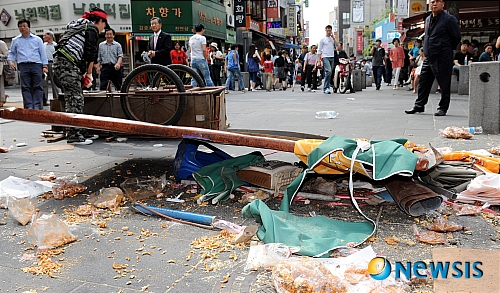
Just one week ago(5.24) thugs ("demolition workers"), hired by the Jongno-gu office...

...attacked the Insa-dong street vendors
The violent physical clashes are expected to be repeated as workers hired by the ward office will use force to push the plan to relocate the recalcitrant stall owners to two designated spots so tourists can more freely walk along the main street of Insa-dong.
The crackdown is also in line with a move to make the street car-free on weekdays as well as weekends.
Vendors a part of culture
However, street vendors are resisting the relocation plan, using their bodies to block demolition workers from taking their stalls.
Some of the stalls were broken into pieces with their owners defiantly opposing the crackdown. One street vendor passed out during the clash and was taken to a nearby hospital.
The clash obviously shocked citizens and travelers witnessing the violence in one of the most popular attractions for foreign tourists.
There have been more than 30 minor and major clashes there this year.
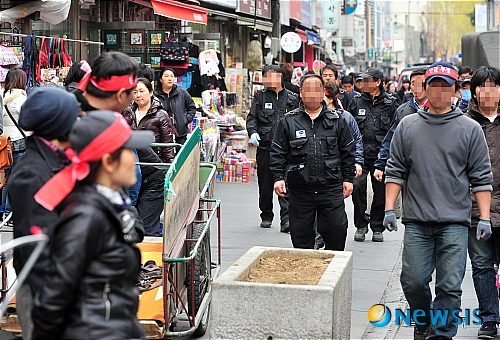
In the beginning of April large forces of "demolition workers"...
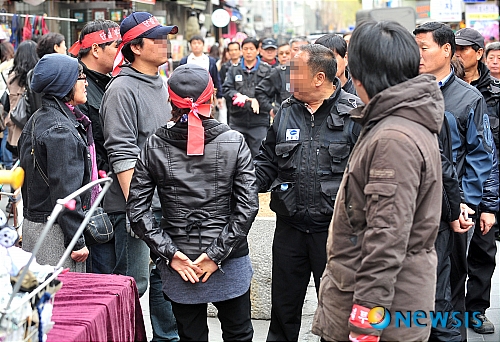
...threatened the Insa-dong street vendors with massive violence!!
Stallholders claim their sales will suffer drastically as the new sites are away from central Insadong and obviously less traversed by tourists.
“They are threatening our survival,” said Kim Geun-ki, a senior member of Jongno Street Vendor’s Union. “They’re moving us to places where few people visit, and it is obvious that we won’t make a living there.”
Kim, who has sold “yeot” (Korean taffy) from a stall for 15 years, said 730 street vendors from Jongno 1-ga to 6-ga streets were all moved to eight locations in 2009 and are suffering from financial difficulties.
“At that time, Seoul City and Jongno Office promised to support us once we moved to the designated locations. But they haven’t received any support, and behind the main streets, the business of most street vendors was destroyed. The same thing will happen to street vendors here, too,” he said.
Street vendors will pay necessary taxes, if the ward office legalizes their business in the street, which is the best solution, he said.
Regarding the street vendors, many foreign visitors said street stalls are part of the Insadong culture, which makes the atmosphere more interesting and appealing.
“It’s fun to see all these different street vendors here. I don’t have any problem with them. They don’t harass me or anything.” Chris Hotsworth from the U.S. said, who visited the street with his family. “I think it’s part of Insadong culture.”
Citizens’ right to walk
But the ward office is firm on its plan, claiming pedestrians’ right to have a pleasant walk on less congested streets should be the first priority.
“Such stalls are all illegal in principle. Visit here during weekend, you can’t walk easily due to many street vendors blocking the way,” said Kim Oh-hyeon, an official from the office. “We initially planned to move all 78 stalls here to the new sites, but now decided to move only 24 stalls, considering the condition and request of the stallholders. I think they also need to make a compromise.”
Relocating street vendors is also important in order to keep shops from displaying their goods outside. “Without the relocation of street vendors, we can’t regulate shops when they illegally occupy the pedestrian area, either,” he said.
Regarding the physical clash, which give visitors a bad impression of Korea, Kim said it is an inevitable part of the enforcement of law.
“We’re trying to minimize physical clashes, but some of the street vendors are the cause as many people here show sympathy to the stallholders, but we will act the boundary of the law,” he said.
The ward office is handing out leaflets to visitors to explain the necessity of the relocation of the street vendors, in four different languages.
Last Thursday, both sides called for a truce after the brutal clash ahead of the upcoming meeting between representatives of street vendors and the head of the ward office.
The peace may be short-lived as both parties are unlikely to narrow their differences on the relocation plan. Rather the conflict may escalate as the deadline of the relocation is set for June 15.
http://www.facebook.com/?ref=logo#!/profile.php?id=100001418267150
FIGHT gentrification!
STOP the social cleansing!!

Today - once again - the S. Korean ruling class called their henchmen to crush a justified strike/workers protest!

Police disperse striking unionists in a raid at Yoosung Enterprise Co., an auto parts supplier
for domestic car makers, in Asan, South Chungcheong Province, on May 24. Operations
of the factories of local car makers, including Hyundai Motor Co. and Kia Motors Corp.,
were halted due to their subcontractor's strike. Yoosung produces piston rings, cylinder
liners and other key components needed to manufacture car engines. (Yonhap)
Here a short summarized 'chronology':

At 4(KST) in the afternoon: striking workers awaiting the (already announced)
attack by the riot cops...

And only a few minutes later it became the reality...

...with excessive force (by "thousands of riot cops", according to Yonhap)!!

At 6 p.m. 533 (according to Minjung-ui Sori) striking workers were arrested!
Finally today's (bourgeois) Korea Times reported the following:
Police disperse striking Yoosung workers
Thousands of riot police raided a regional auto parts manufacturing plant, Tuesday, to put an end to a week-long “illegal” strike that disrupted the production of Hyundai Motor and other major automakers.
More than 2,500 police entered the factory of Yoosung Enterprise in Asan, South Chungcheong Province, at 4:00 p.m., where hundreds of unionized workers have been holed up over the past week, according to South Chungcheong Provincial Police Agency.
Police met little resistance from the workers while dispersing them. About 500 unionists were apprehended.
“We had to use force to disperse the striking workers and hand control of the facility back to the management. The raid was unavoidable as last-minute talks between management and the employees on strike fell apart,” a police officer said.
Police will decide whether to detain the workers or not after looking into their involvement in the walkout.
Police obtained arrest warrants for two union leaders and a search warrant for union offices from the Daejeon District Court.
He said 31 companies of riot police and three police vehicles equipped with water cannons were deployed to the scene.
Police helicopters hovered above the site to monitor the movements of the striking workers.
More than 500 unionized workers began occupying the factory on May 18 after they failed to reach common ground with their management on working conditions and salaries. Following the walkout, the management of Yoosung Enterprise, which specializes in piston rings, cylinder liners and other key components of car engines, imposed a lockout on the plant.
On Monday, the company’s management and labor held unsuccessful talks to resolve the confrontation.
The Korea Confederation of Trade Unions (KCTU), affiliated with Yoosung labor union, released a statement condemning the police raid.
“Law enforcement authorities refused to follow law and order by sending riot police into the plant. This is tantamount to a barbaric act. We will fight along with unionized workers of Yoosung Enterprise to the end until we achieve our goals,” the KCTU said.
It said it will launch a nationwide campaign to force President Lee Myung-bak to step down.
Despite the strike coming to an end on Tuesday, it will likely take some time for the plant to resume operations, meaning that automakers will have to grapple with output disruption for the time being.
According to the auto industry, the ongoing strike has forced automakers to suspend production of several vehicles due to a shortage of engine components.
Yoosung supplies key engine components to all five automakers operating here. In particular, Hyundai Motor and Kia Motors, the nation’s two largest automakers, depend heavily on its supply as they receive 70 percent of engine-related components from the firm.
Hyundai and Kia said if the walkout lasts through the end of May, they will be forced to cut output by as much as 50,000 cars. The other three carmakers — GM Korea, Renault Samsung and Ssangyong Motor — will see their production drop by a combined 10,000.
Hyundai has already been forced to shut down its assembly line for the Tucson ix sports utility vehicle, while Kia had to halt production of its Carnival passenger minivan.
According to the Korea Employers Federation, the labor strike has already cost automakers over 150 billion won in lost output as of Tuesday. From May 26, they will likely incur over 100 billion won in losses on a daily basis.
http://www.koreatimes.co.kr/www/news/nation/2011/05/117_87577.html
Since y'day you can find the following piece on the English main page of Yonhap news agency:
Former noodle restaurant Dooriban highlights legal loopholes letting down evictees
The South Korean capital, Seoul, has not mushroomed in population from a few hundred thousand to over 10 million in a little more than half a century without ongoing and dramatic changes being made to its cityscape.
But as the saying goes, what goes up must first be knocked down. Parks and mountains aside, Seoul's dense urban fabric is such that hardly any land, let alone a plot big enough for a sizeable building project, lies vacant. This occasionally causes protracted -- even violent -- conflicts.
Korea's most notorious case of redevelopment-related conflict reached a climax on Jan. 20, 2009, in Yongsan, central Seoul, when five evictee protesters and one policeman were killed in a fire that erupted during a violent clash.
The incident shocked Korean society to some extent, but has so far failed to prevent further stalemates of the kind from which it resulted.
One such situation is to be found at Dooriban, formerly a noodle restaurant next to Hongik University in western Seoul. It now stands as one of the only two remaining structures on an otherwise razed plot of land. The other is an empty traditional Korean hanok building (*), the demolition of which Dooriban's occupants have also struggled to prevent.
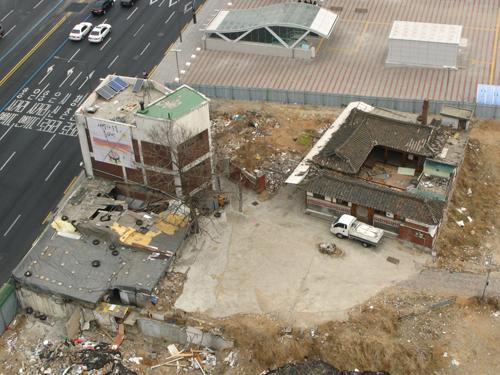
While GS Engineering & Construction, the current owner of the plot, waits for a chance to complete the demolition job and start building, Dooriban is holding out in protest at what, according to its owner, is a highly unjust eviction attempt that would effectively cast her out onto the street.
"We were offered three million won (US$2,700) in compensation," says Yoo Che-lim, the husband of Dooriban's owner Ahn Jong-nyeo. "Normally, the legal act that protects small business owners and tenants grants the right to do business for at least five years, but a subordinate clause states that this does not apply in areas designated for redevelopment."
Another law that entitles evicted small business owners to compensation for investments they have made in their own businesses also fails to apply to Dooriban, apparently because the scale of the redevelopment plot is too small.
Yoo quit his job at a publishing company in order to join the full-time occupation now in progress at Dooriban. "The law is wrong," he says. "It needs fixing. Applied as it currently is, it amounts to violence, not law."
Yoo likens the current legal struggles of evictees to those of early campaigners for the rights of women or black people, who also found themselves on the wrong side of existing laws at the time.
As of mid-May 2011, the Dooriban protest has been going on for one year and six months. After legal attempts by an alliance of local residents to secure adequate levels of compensation from GS E&C failed, Dooriban eventually remained as the only business to refuse subsequent increased cash offers from the construction giant.
The Dooriban owner, Ahn, is clear about her demands.
"Of course, I want the means to reopen Dooriban in this neighborhood, as well as compensation for lost Dooriban income, my husband's lost income since he quit his job, and compensation for our expenses in occupying this building in the mean time," she says.
When Dooriban's electricity supply was severed last summer, many of its occupants conducted a sit-in protest for a week at the headquarters of Mapo ward where it is located.
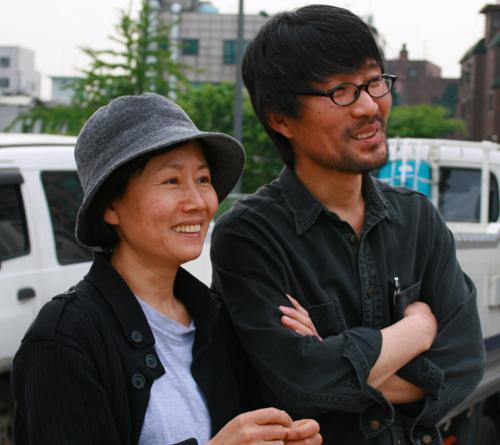
Dooriban owner Ahn Jong-nyeo and her husband Yoo Che-lim
"We claimed that it was the duty of the ward authorities to provide their citizens with commodities such as electricity," says Yoo. "The ward head said he would 'give us electricity.' He gave us a generator, but is not providing oil to run it."
An employee at Mapo ward's department of urban planning derides the notion that it is up to the ward to ensure that electricity is provided. "That's up to KEPCO (Korea Electric Power Corporation)," he says. "Anyone knows that."
"We hope the matter is resolved harmoniously," says a more senior employee from the same department.
With regard to Ahn's hope that Mapo ward will provide an opportunity for Dooriban to sit down and talk with GS E&C, he says the ward would have no objections if both sides requested the use of space in its headquarters to engage in dialogue.
Mapo ward declines to explain why it provided the generator.
Negotiations with GS E&C have been complicated by the fact that the construction company has allegedly subcontracted another enterprise, named Samojin, to complete the demolition job on the plot.
"Samojin has a bad reputation as the subcontractor that takes on the toughest demolition jobs and uses the most violence," says human rights activist Dopehead Zo, who currently spends much of his time supporting Dooriban by means including Internet broadcasts and Twitter.
"Samojin is working with GS E&C at a similar site at Dorim-dong in Yeongdeungpo ward," adds Zo. "A lot of illegal demolition and violence is going on there."
Having lost its gas supply and had most of its kitchen equipment forcibly removed, Dooriban no longer functions as a restaurant. It remains, however, busy with regular support concerts, talks, flea markets, film festivals and other events, and has become a symbolic hub of activism.
"We're under pressure but we're strong because lots of people are involved," says Yoo as he sits by the charcoal briquette stove on the first floor. "We're not arming ourselves or looking for a fight, but if Samojin approaches us with violence, we are prepared to resist."
"We use a lot of social media," says Zo. "If there is an immediate threat, we can send out a tweet," If this happens, Zo claims, a considerable number of people will arrive in around 20 minutes.
When contacted in early May, Samojin CEO Kim Bong-jung, expressed bemusement that Dooriban was receiving so much media attention when "there are so many other tenants in worse situations, they're just not intellectuals."
"We do our best to reach an agreement between the redevelopment association and the tenants. Every day that tenants resist, the members of the redevelopment association lose money. The tenants can stay there forever: it reaches a stage where we can't mediate any longer."
Kim claims an agreement was recently reached between Samojin and a committee formed of pastors, members of two progressive minor opposition parties -- the Democratic Labor Party and New Progressive Party -- and others representing Dooriban. "It should all be solved later this week or next week," he says.
Yoo is not so sure.
"In late April, we conveyed our demand, via the committee, to Samojin that it provide the means for Dooriban to reopen somewhere else in the local Hongdae area," he says. "At the time, Samojin agreed. But we haven't heard anything for more than three weeks, so we're not sure if they really meant it or whether they want to lull us into a false sense of security before attacking."
In the mean time, a group of activists is attempting to get a law passed that bans forcible eviction in such cases. As long as the law remains unchanged, however, Dooriban's status remains precarious and its struggle, with widespread local support, continues.
http://english.yonhapnews.co.kr/national/2011/05/16/34/0302000000AEN20110516001800315F.HTML
* Actually there's right now an independent art gallery inside.
Related report:
☞ Duriban - 500 Days of Struggle Against 'Reconstruction' (2011.5.08)
1.) 쌍용차 故임무창조합원 49재, 교섭촉구 결의대회에 함께합시다

2.) 4.15 삼성자본 규탄 결의 대회 함께합시다.

주체: 과천철거민과 삼성일반노조
일시: 4월 15일 (쇠 날) 11시 30분-13시까지
장소: 삼성본관 정문 바로 옆(2호선 강남역 4번 출구)
For more info please check out: ☞ 4/15 삼성자본 규탄 결의 대회...!


After one month of fierce battles between the pro-democratic movement and forces - Libyan Air Force, several elite units of the Libyan Armed Forces and foreign mercenaries - loyal to Muammar "The Butcher" Gaddafi, it's almost certain that the counter-revolution is winning!
Here just two leading headlines in today's European press:
Guardian(UK): "Benghazi braces for battle as Libya endgame nears"
Spiegel(Germany): "The Last Days of Benghazi"
About one hour ago the following comment was posted on CNN:
"If we sit quite watching this and Gaddafi kill all rebels and win, we would be sending a message to all middle east dictators to use power and violence against protesters. Its seems to work for Gaddafi. if we do not stop Gaddafi now and he wins, it is gonna be the end of revolutions in the Arab world..."
Yep. But it wasn't a "mistake" by the so-called "int'l community", i.e. the "rulers" of the U.S.A., E.U., the Middle and Far East!!!
They only did a "good job" to use the already assumed and accepted bloody counterinsurgency in Libya as a cautionary tale against potential "copycat criminals", especially on the Arabian Peninsula - just like the current pro-democratic movement in Bahrain.
And finally the likely defeat of the Libyan anti-Gaddafi movement - incl. its presumed literal annihilation (i.e. mass murder) - will be the result of the complete fault by the int'l "solidarity" movement/the int'l civil and human right organizations!!!
덧글 목록
관리 메뉴
본문
Tut mir Leid ㅜㅜ Wenn du mir angerufen hast, musste ich bald das Konzert anfangen. Ich freue mich darüber, dass du hier in Korea ohne Probleme gekommen hast. Während du in Seoul bliebst, ich möchte dich in Duriban oder im anderen Ort treffen. Ruf mir an, wenn du zeit hast. 나는 일단 월, 수, 금 저녁 빼고는 대부분 시간이 괜찮아요^^부가 정보